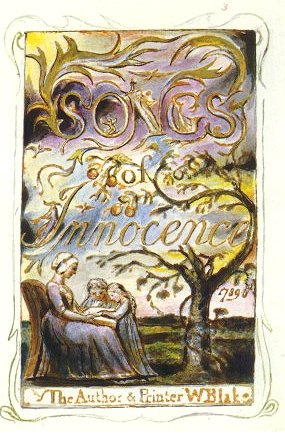August 2, 2021: Difference between revisions
From Gerald R. Lucas
(Created entry. More to do.) |
(Added more.) |
||
| Line 23: | Line 23: | ||
Piper sit thee down and write | Piper sit thee down and write | ||
In a book that all may read—{{refn|The child, a personification of innocence and a care-free existence, asks the piper to to write down his songs to share with the world, and perhaps preserve them as remembrances of more innocent times for when he grows up {{harvnb|Tomlinson|1987|p=27}}). Indeed, the child disappears at the moment the piper begins to write, suggesting that the process of composition leads to wisdom in some | In a book that all may read— | ||
So he vanish’d from my sight.{{refn|The child, a personification of innocence and a care-free existence, asks the piper to to write down his songs to share with the world, and perhaps preserve them as remembrances of more innocent times for when he grows up {{harvnb|Tomlinson|1987|p=27}}). Indeed, the child disappears at the moment the piper begins to write, suggesting that the process of composition leads to wisdom in some way—compare to the Bard in this poem’s [[Introduction (SE)|contrary]], who “Who Present, Past, & Future sees.” The child may have been some aspect of the piper, an allegory of the waning innocence of the piper, perhaps. The purpose of these songs might be to spark joy, but also to remind us of what a lost innocence is like. }} {{ln|15}} | |||
And I pluck’d a hollow reed, | And I pluck’d a hollow reed, | ||
| Line 41: | Line 41: | ||
* {{cite book |last=Battenhouse |first=Henry M. |date={{date|1958}} |title=English Romantic Writers |url= |location=New York |publisher=Barron’s Educational Series, Inc. |ref=harv }} | * {{cite book |last=Battenhouse |first=Henry M. |date={{date|1958}} |title=English Romantic Writers |url= |location=New York |publisher=Barron’s Educational Series, Inc. |ref=harv }} | ||
* {{cite book |last=Gardner |first=Stanley |date={{date|1969}} |title=Blake |url= |location=New York |publisher=Arco |series=Literary Critiques |ref=harv }} | * {{cite book |last=Gardner |first=Stanley |date={{date|1969}} |title=Blake |url= |location=New York |publisher=Arco |series=Literary Critiques |ref=harv }} | ||
* {{cite book |editor-last=Greenblatt |editor-first=Stephen |date={{date|2018}} |title=The Norton Anthology of English Literature |series=The Major Authors |volume=2 |edition=Tenth |url=https://amzn.to/3rgnJOH |location=New York |publisher=W. W. Norton | * {{cite book |editor-last=Greenblatt |editor-first=Stephen |date={{date|2018}} |title=The Norton Anthology of English Literature |series=The Major Authors |volume=2 |edition=Tenth |url=https://amzn.to/3rgnJOH |location=New York |publisher=W. W. Norton |ref=harv }} | ||
* {{cite book |last=Tomlinson |first=Alan |date={{date|1987}} |title=Song of Innocence and of Experience by William Blake |series=MacMillan Master Guides |url= |location=London |publisher=MacMillan Education |ref=harv }} | * {{cite book |last=Tomlinson |first=Alan |date={{date|1987}} |title=Song of Innocence and of Experience by William Blake |series=MacMillan Master Guides |url= |location=London |publisher=MacMillan Education |ref=harv }} | ||
{{refend}} | {{refend}} | ||
Revision as of 09:27, 31 August 2021
|
Piping down the valleys wild |
Notes & Commentary
- ↑ The introductory poem from the Songs of Innocence, 1789, which defines the “emotional conditions” of the poems in this book Tomlinson 1987, p. 27). However, these are not poems that reflect an innocence in reality as many of them contain images of suffering and injustice, but instead show the emotional state of the, in Blake’s words, “human soul” that views them (Greenblatt 2018, p. 48).
Compare this poem to its contraries, the “Introduction” and “Earth’s Answer” from Songs of Experience. See also the introductory note on “The Lamb” for more background into Blake’s poetic composition and philosophy. - ↑ The narrator is the piper, a child in tune with nature, suggesting a more emotional, rather than intellectual or ration, connection with the world that is reflected in the content of the poem.
- ↑ The child, a personification of innocence and a care-free existence, asks the piper to to write down his songs to share with the world, and perhaps preserve them as remembrances of more innocent times for when he grows up Tomlinson 1987, p. 27). Indeed, the child disappears at the moment the piper begins to write, suggesting that the process of composition leads to wisdom in some way—compare to the Bard in this poem’s contrary, who “Who Present, Past, & Future sees.” The child may have been some aspect of the piper, an allegory of the waning innocence of the piper, perhaps. The purpose of these songs might be to spark joy, but also to remind us of what a lost innocence is like.
- ↑ Again, the act of writing stains the purity of the moment, passing it through the imagination and the pen of the poet. Perhaps there must be experience before the imagination may reflect on the state of innocence.
Work Cited
- Battenhouse, Henry M. (1958). English Romantic Writers. New York: Barron’s Educational Series, Inc.
- Gardner, Stanley (1969). Blake. Literary Critiques. New York: Arco.
- Greenblatt, Stephen, ed. (2018). The Norton Anthology of English Literature. The Major Authors. 2 (Tenth ed.). New York: W. W. Norton.
- Tomlinson, Alan (1987). Song of Innocence and of Experience by William Blake. MacMillan Master Guides. London: MacMillan Education.
Links
- Blake at the Internet Archive.
